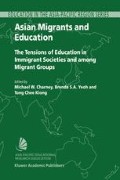Abstract
Education was an extremely important focus of Tan Kah Kee’s many philanthropic activities that spanned China and the Nanyang. Indeed, his biographer has identified as first among his three legacies his contribution to a “model of modernization through the promotion of education and industrial and technological development” (Yong 1987 355). He established schools in his home village of Cheng Mei and a university in Amoy. In Singapore, where he spent the major part of his life, he made similar important contributions funding numerous Chinese language schools, including Chinese High School, as well as establishing a Chinese language teacher training college just prior to the Japanese invasion of Singapore. But Tan did not take a narrow view of educational needs as he also was a major contributor to the Anglo-Chinese School and Raffles College-both highly important English-language educational institutions. Tan made these contributions as an immigrant in a society characterized by great ethnic diversity, a society that today we would easily recognize as being, at least in demographic terms, “multicultural.”
Access this chapter
Tax calculation will be finalised at checkout
Purchases are for personal use only
Preview
Unable to display preview. Download preview PDF.
Notes
Elsewhere I have distinguished three usages of the term “multiculturalism” (Inglis 1996). Apart from being a demographic statement referring to the ethnic diversity in a population it has also been used to refer to specific types of policy (programmatic multiculturalism) and to ideological objectives (normative multiculturalism). In this chapter, I attempt to make clear when the usage changes to one of these two latter forms.
This interpretation differs from that of Davies and Guppy (1997) who argue that growing devolution of choice is accompanied by increasing centralization in education systems. They explain this process by reference to the growing influence of local reform and minority associations associated with the growth of the power of educational policy-makers, which is leading to the displacement of teachers and other professional educators. This view ignores the economic costs associated with education and the growing support for ideas of “small government” and market oriented strategies of “user-pays.”
Not until the 1990s was an anti-racism policy actually developed as a complement to the Multicultural and Aboriginal Education Policies.
Editor information
Editors and Affiliations
Rights and permissions
Copyright information
© 2003 Springer Science+Business Media Dordrecht
About this chapter
Cite this chapter
Inglis, C. (2003). Contemporary Educational Issues in Multicultural Immigrant Societies. In: Charney, M.W., Yeoh, B.S.A., Kiong, T.C. (eds) Asian Migrants and Education. Education in the Asia-Pacific Region: Issues, Concerns and Prospects, vol 2. Springer, Dordrecht. https://doi.org/10.1007/978-94-017-0117-4_11
Download citation
DOI: https://doi.org/10.1007/978-94-017-0117-4_11
Publisher Name: Springer, Dordrecht
Print ISBN: 978-90-481-6302-1
Online ISBN: 978-94-017-0117-4
eBook Packages: Springer Book Archive

